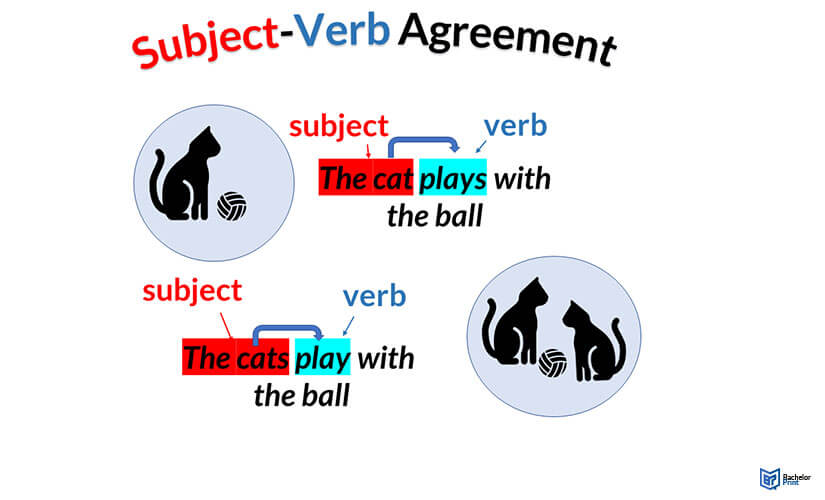
Subject-verb agreement is a vital part of language rules, shaping the backbone of coherent English communication. It ensures that subjects and verbs coincide in number, i.e., singular subjects take singular verbs, while plural subjects take plural verbs. An essential component of linguistic proficiency, its correct application is crucial for clear, effective communication. Errors can lead to confusion, obscuring the intended message. Learn to master these rules in this article.
Definition: Subject-verb agreement
Subject-verb agreement is a grammatical principle in English that dictates a verb must agree in number (singular or plural) and person (first, second, or third) with its subject in a sentence. This rule ensures clarity and cohesion in written and spoken communication.

Subject-verb agreement: Compound subjects
Compound subjects refer to instances where two or more subjects in a sentence are connected to one verb.
Subject-verb agreement: Subjects linked with “or”
When the compound subjects are connected by “or”, “either…or”, “nor”, and “neither… nor”, you should use a singular verb.
You should only use a plural verb if the subjects used are in plural form.
When compound subjects have both singular and plural subjects, you should consider the subject that has the closest proximity to the verb to achieve subject-verb agreement.
Subject-verb agreement: Subjects linked with “and”
If the compound subjects are joined by “and”, the verb takes a plural form.
An exception to this rule is if the two subjects refer to one entity. In that case, you should use a singular verb.
Subjects separated from verbs
One could make subject-verb agreement mistakes when the verb does not come directly after the subject. In long sentences with phrases separating the subject and verb, one should ensure they match the verb with the correct subject for subject-verb agreement.
| ✘ Incorrect | ✓ Correct |
| A tray of eggs were in his house | A tray of eggs was in his house. |
| Observers of the game was disappointed. | Observers of the game were disappointed. |
| The ten groups at the end is moving to the finals. | The ten groups at the end are moving to the finals. |
Subject-verb agreement: Tricky phrases
There is a difference between “as well” and the conjunction “and”. When one uses “and” to connect subjects, one should always use a plural verb.
In contrast, some phrases like “as well as”, or “along” have no connection to the verb. So, the verb takes the form of the subject.
| ✘ Incorrect | ✓ Correct |
| The mother and her sons loves the movie. | The mother and her sons love the movie. |
| The mother, along with her sons, love the movie. | The mother, along with her sons, loves the movie. |
| The mother, as well as her sons, love the movie. | The mother, as well as her sons, loves the movie. |
Subject-verb agreement: Subjects after the verb
When a subject follows the verb, especially in sentences that start with here or there, the student should identify the subject and match it with a verb.
Subject-verb agreement: Indefinite pronouns
Indefinite pronouns are used to refer to non-specific persons, items, and places. They are considered as singular subjects unless they refer to multiple items.
| Indefinite pronouns | Examples | |
| Take singular form | Pronouns that end in -thing, -body, -one, or -where Other pronouns like every, each, one, another |
Somebody eats carbs. Every student writes an essay. Something smells bad. |
| Take plural form | Many, others, few several, both | Few employees are hardworking |
|
Take singular or plural form |
None, all, some, most, more, any, either | Most of the movies were boring. Most of the movie was boring. |
Subject-verb agreement: Numbers and amounts
In the case of numbers, percentages, or proportions, one has to focus on the true subject, rather than the number.
If you use a specific number of something, the verb should match the noun, rather than the number.
This rule applies to a number that refers to an unnamed noun.
If the subject is a number describing a unified quantity of something, the verb takes singular form to achieve subject-verb agreement.
Subject-verb agreement: Proportions
Proportions are accompanied by the term “of”. When dealing with proportions, first determine if the noun is singular or plural and link it to the verb.
Uncountable and collective nouns
It’s difficult to establish the number form of uncountable and collective nouns.
Subject-verb agreement: Uncountable nouns
Uncountable nouns refer to abstract items or masses that one cannot count, such as research, and water—link such nouns with a singular verb.
The term “data” is considered to be both an uncountable and plural noun. As such, a verb following this phrase can take either form.
Subject-verb agreement: Collective nouns
A collective noun refers to a phrase used to collectively describe a group of people or things. Collective nouns may take a singular verb in US English and a plural one in UK English.
This rule is maintained in regards to company names.
| US English | UK English |
| The staff is happy. | The staff are happy. |
| The team wins. | The team win. |
| The committee attends an annual meeting. | The committee attend an annual meeting. |
| Target is a popular shopping store. | Target is a popular shopping store. |
| The population is sick. | The population are sick. |
Even so, this rule is flexible; to determine subject-verb agreement, one should consider whether the noun emphasizes a unified entity or individual items/persons.
Printing Your Thesis With BachelorPrint
- High-quality bindings with customizable embossing
- 3D live preview to check your work before ordering
- Free express delivery
Configure your binding now!
Acronyms and abbreviations
When using acronyms and abbreviations, the verb takes a singular verb unless abbreviation letters represent a collective noun or plural subjects.
FAQs
It’s when the subject in the sentences matches the verb.
When the noun emphasizes individual items.
They take a singular verb.
Use a singular verb.
